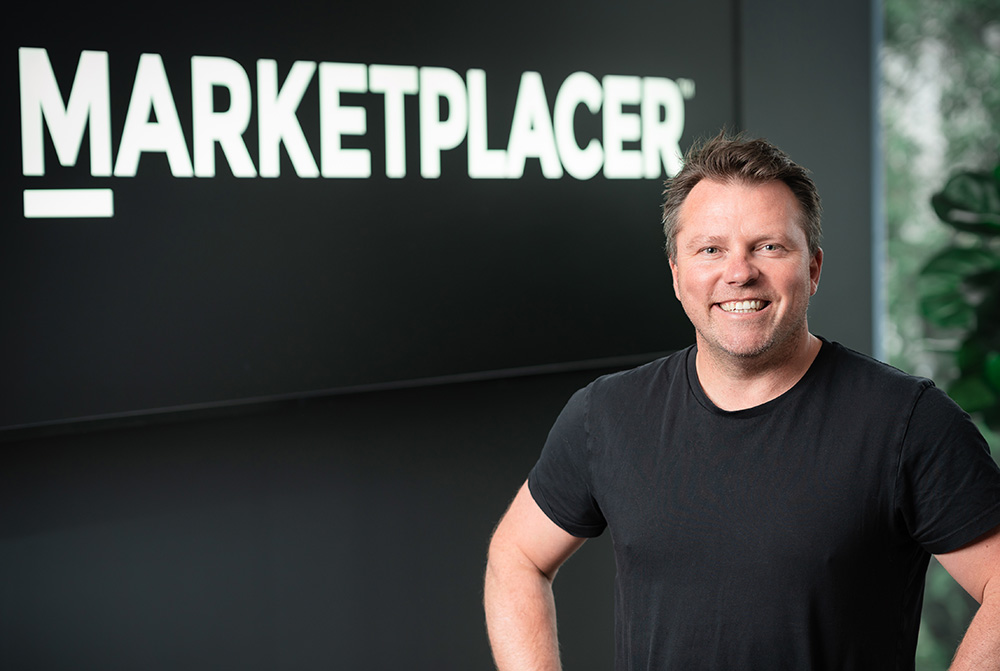On the lighter side of things, we ask Jason Wyatt, Founder, Marketplacer, what makes him tick.

What would you describe as your most memorable achievement?
Creating Marketplacer! From a standing start in 2015, the company I co-founded with Sam Salter has become one of the world’s most innovative technology brands, present in 10 countries and serving the shopping needs of hundreds of millions of people. I’ve always had an entrepreneurial spirit – I never wanted to just be a worker; I wanted to be an owner and a creator – and seeing our vision transformed into reality has been incredibly rewarding.
What first made you think of a career in technology?
I always thought it was the future. If you’re going to create a career, you want it to be in a sector that’s going to grow; somewhere that’s fast paced and exciting, and where you’re surrounded by amazing people who see things the same way. Tech is, without doubt, the most exciting area you can think of to work in, unless, perhaps, you’re in the vaccine development space! It’s innovate or die – you’re constantly solving problems, and thinking about what’s next and you’re doing it at scale. That’s very different from most nine to five jobs.
What style of management philosophy do you employ with your current position?
I’m a big believer in genuine collaboration and in growing together, and so I see our workforce as a collegiate team, not a group of individuals arranged in a hierarchy. Being very consistent in your approach and behavior is important – people aren’t going to get behind a boss who is angry one day, sad the next and happy after that – and so is setting a clear vision and a roadmap for how you’ll get there. While a lot of people have natural leadership qualities, I think being a good leader is something you need to work at every day – the best ones I’ve known have all wanted to become better versions of themselves.
What do you think is the current hot technology talking point?
Implementing a marketplace strategy! It’s the next big evolution of e-commerce. A marketplace is not just some tool that you plug in and it increases your sales by a percentage point or two – it’s a means by which merchants can very quickly grow their turnover by 30% and significantly improve their customer experience into the bargain. Covid has precipitated its progress: we had 10 years of growth in a day, once businesses realized the opportunities that were available to enterprises with digital infrastructure in place. Now, we’re seeing independent analysts producing reports on the marketplace market itself. That’s evidence the sector is being taken seriously; that it’s a lemon well worth squeezing.
How do you deal with stress and unwind outside the office?
Having access to an online pilates coach has been very good for the soul during the endless Melbourne lockdowns. The other thing I try to do is a bit of meditation at night, before I go to sleep. Outside of Covid, I’m a big sports buff. I surf three or four times a week and I love my skiing and anything outdoors. Avoiding the trap of being constantly compromised helps me make my downtime count. That means being present with my kids, if I’m with my kids and thinking about surfing or cycling or Pilates if that’s what I’m doing. ‘Containerizing’ your mind, rather than trying to do everything at once, allows parts of it to rest so it can recover and grow.
If you could go back and change one career decision, what would it be?
We were already an early mover but I think I would have gone harder on Marketplacer sooner. In my mid-thirties, I was doing 15 businesses poorly and when I switched my focus to building one business really well, we exploded. So, if it were possible to put an older head on younger shoulders, I’d say ‘wind things back and do less but do what you’re doing better’.
What do you currently identify as the major areas of investment in your industry?
People. At Marketplacer, we don’t buy stuff and sell stuff. We make stuff and figure out how companies can use it, and our number one investment will always be in the employees who make that happen. That doesn’t just mean paying them more or putting on free breakfasts, it’s about galvanising people around our values: empowerment, accountability, achievement, success and the celebration of that success.
What are the region specific challenges when implementing new technologies in APAC?
A lot of international software vendors and platforms don’t understand the regulatory frameworks that countries in APAC operate under. They also tend to underestimate how much care and support customers need in this region. They look at Australia and New Zealand, for example, see a combined population of around 30 million people, think ‘that’s a small market’ and see if they can get away with underservicing it. Because of those factors, businesses in APAC are more inclined to work with smaller local vendors, even if they lack true scale. We strive to go the other way, investing heavily in customer success and killing our users with kindness.
What changes to your job role have you seen in the last year and how do you see these developing in the next 12 months?
Rapid expansion has resulted in a number of changes to my role. Marketplacer launched in the US in early 2021 and that necessitated our setting up global sales and go-to-market teams to help us understand and navigate customers and cultural differences. Before Covid, I was a frequent traveler and I’m keen to stop spending 13 hours a day looking at a screen and to start spending time hanging out with humans again.
We have a team of 25 in the US, none of whom I have met. I’m looking forward to breaking some bread and drinking some beers with them after Australia opens up.
What advice would you offer to someone aspiring to obtain a C-level position in your industry?
Don’t underestimate what it takes to listen, concentrate and make decisions, all day, every day. Being in the C-suite means you’re constantly ‘on’ and that is tiring. I also see a lot of people coming up to the C-level who don’t have cross-functional experience. Typically, they’ve risen up the ranks because they’ve been highly proficient in one area but that can mean they have gaps in others – they’ve never been exposed to finance or product development, for example, or they don’t understand customer success. I’d recommend plugging those gaps before you take the top job. And once you get there, have some fun. Some aspiring leaders are so bullish – they can rip the flesh off the bone – but they forget that getting people to follow you up the hill is easier than pushing them!


